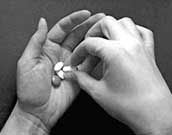|
|
 |
|
The views expressed on this page are soley
those of the author and do not
necessarily represent the views of County
News Online
|
 |
Start Talking!
Know! The Risk
Factors Associated with Drug Addiction
9/13/2018
September is National Recovery Month. Sponsored by the Substance Abuse
and Mental Health Services Administration (SAMHSA), Recovery Month is a
time to increase awareness and understanding of mental health and
substance use disorders and celebrate people living in recovery.
More than 20 million Americans are currently in recovery from
addiction, which is something to celebrate! Tragically, however, more
than 20 million more Americans are currently facing addiction.
Have you ever wondered why some people become addicted to alcohol and
drugs, while others don’t?
Many people believe those who are addicted to substances simply lack
moral principles or willpower, and make the conscious choice to
continue to use. The truth is more complicated, however. While people
may initially choose to use alcohol and other drugs, the brain changes
over time from repeated drug use. These changes severely impact our
kids’ self-control and hinders their ability to stop using.
Just like any other disease, vulnerability to addiction is different
for each person. No single factor determines if someone will become
addicted to substances or not. What we do know is that the more risk
factors a person has, the greater the likelihood for abuse and
addiction. On the flip side, the probability for substance abuse and
addiction decreases in people who possess more protective factors.
Risk factors include:
Aggressive behavior in childhood
Lack of parental supervision
Poor social skills
Drug experimentation
Availability of drugs at school
Community poverty
Protective factors include:
Good self-control
Parental monitoring and support
Positive relationships
Academic know how
School anti-drug policies
Neighborhood pride
According to the National Institute on Drug Abuse (NIDA), risk and
protective factors are further broken down as either environmental or
biological. Environmental risk and protective factors pertain to
conditions at home, school and in the neighborhood. Biological risk and
protective factors, meanwhile, are related to a person’s genes, their
stage of development, gender and ethnicity.
Environmental: A child’s home environment, for example, is crucial in
determining risk. Children are much more likely to experience drug
problems themselves if their parents or older family members abuse
alcohol or drugs or are engaged in criminal behavior. Friends and peers
also matter greatly, especially during adolescence. A drug-using peer
can influence even those without other risk factors to try drugs for
the first time. Academic failure or poor social skills can also
increase a child’s risk for using and becoming addicted.
Biological: According to the National Council on Alcoholism and Drug
Dependence (NCADD), a family history of drug use or addiction is the
single most reliable indicator for risk of future alcohol or drug
dependence. A family history of mental health problems also increases
one’s risk.
A person’s age of first use is another critical factor in determining
one’s risk for addiction. The earlier the onset of drinking, smoking,
or using other drugs, the greater the likelihood for addiction later in
life.
It is important that parents and other caregivers KNOW! that every
child is at risk for substance use. It is also important to keep in
mind that family history does not determine one’s destination; and that
awareness is the first step toward prevention.
Addiction is harmful and destructive to not only the individuals using
but their family and friends as well. However, the message SAMHSA wants
people to hear is that addiction is a treatable disease. Prevention
works, treatment is effective, and people can and do recover.
If you, your child or other loved one needs help, here are some
resources to get you started (see link below):
National Institute on Drug Abuse’s (NIDA’s) What to Do If Your Teen or
Young Adult Has a Problem with Drugs provides parents of teens and
young adults with information on how to identify and handle possible
drug misuse situations.
National Institute on Drug Abuse’s (NIDA’s) What to Do If Your Adult
Friend or Loved One Has a Problem with Drugs includes a list of the
warning signs of drug misuse as well as resources and information to
help someone who might have a drug use problem.
Learn how to get your drug abuse prevention conversation started at
StartTalking.Ohio.Gov.
Get additional information at Start Talking!
|
|
|
|

